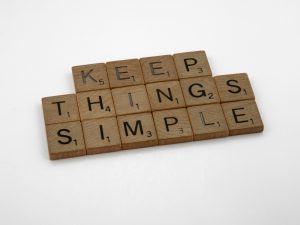On this week’s Engaging Marketeer podcast, I’m going to talk about something which affects most people, particularly within business and within sales. It’s something I came across again today while I was on a walk around Chester with the Hospice of the Good Shepherd. We did a netwalking walk that started at the Station Tap in Chester and went around the walls, past the canal and across to the amphitheatre.
As always happens when you walk towards the amphitheatre, the subject of that great ugly building that’s sat on top of the amphitheatre in Chester came around. And how some people want that building preserved and renovated. Most people, myself included, want it razed to the ground so we can actually uncover the other half of the amphitheatre underneath it and have what I think would be the only full, complete amphitheatre in the UK.
One of the reasons given for not knocking this ugly building down is that we don’t know if there’s any part of the amphitheatre still underneath it to renovate. It might not be there. That is a limiting belief, and that is what I want to talk about – limiting beliefs.
Someone is saying that it might not be there, so we don’t want to do it. It might not be, but then it might be. You’re putting your own thoughts on something that you can’t control, something that you’re not aware of, and you’re using that as a reason not to do something. That is completely the wrong way to do it.
It could be there. Even if there’s nothing underneath it, if it’s completely gone after, what is it, 1,800 years, then the space could be rebuilt into the new amphitheatre. It could be restored. Something could be put in its place that restores the amphitheatre to its former glory, instead of having half of it covered by a building which is now derelict.
It’s a limiting belief. And we have limiting beliefs in every aspect of our business. Commonly within sales –
“I didn’t ask that person if they wanted to be a client because I didn’t think they had the money.”
That’s my limiting belief on them.
“I don’t think that they can afford it, therefore I didn’t ask them.”
“I think it’s too expensive.”
“I think our product or service costs too much.”
“I don’t think they’re going to like the price.”
“I don’t think they’re going to be able to pay for it.”
That’s a limiting belief. If you put that on someone else, if you use your limiting belief on someone else, then obviously it’s not going to work.
“I didn’t try and sell it to them because I didn’t think they’d want it.”
That’s a limiting belief.
“I didn’t invite that person to my networking meeting because I didn’t think they’d join.”
That’s a limiting belief.
We have it all the time. And what you need to do is get rid of that limiting belief. Stop putting your own preconceptions on other situations because it is going to prevent you from being successful.
It’s in every walk of life. It’s in every aspect. It’s not just business. It’s not just sales
“I didn’t ask that girl out because I thought she would say no.”
That’s a limiting belief.
If you don’t ask, she’s not going to get the opportunity to say no. She’s not going to get the chance to say no because you’ve already made your mind up that that is what’s going to happen. Therefore, you don’t do it. Therefore, you’ve put a limiting belief in the way of something being successful.
“I’m not going to try and start my own business because I don’t think it’s going to work.”
That’s a limiting belief.
It’s really dangerous when other people put their limiting beliefs on you and it prevents you from doing something.
Now, this comes into another podcast I’ve done not so long ago, which is about taking advice effectively from idiots – taking advice from morons that have no idea what they’re talking about.
You get those guys in the pub that say:
“Don’t start your own business, because it’s not going to be successful.”
“It’s not going to work for you.”
“You’re going to fail at that.”
“Why don’t you just get a job like they have?”
“Why don’t you get a nine-to-five so that you don’t have the stress of working on a business outside your normal working hours?”
“You’re never going to be successful with that.”
“You’re never going to make it work.”
“It’s you. It’s not going to happen.”
That’s a limiting belief.
We take limiting beliefs from others and put them into our own walk of life
If we’re looking at starting a business, quite often we’ll take advice from people we know. It could be our family. It could be our friends. They haven’t had a business themselves and they’re going to say:
“Don’t do it. It’s too risky. Why don’t you get a job?”
That is a limiting belief. And it stops you doing something because you’re listening to advice from somebody who’s got no idea what they’re talking about. You’re using their limiting belief and it’s basically ruining your life.
Limiting beliefs affect us in every aspect
So, it’s a very short podcast today. It’s a very short one because I think it’s just something that’s very easy to overcome. It’s very easy to get out of the way once you can identify it. You know, to not do it.
Think—whenever you refrain from doing something because you’re not sure it’s the right thing to do for them – limiting belief.
Limiting belief.
We did it. I said it was a short podcast. It’s not a short podcast actually because there’s another example for this.
We were going to do a large promotion for our networking group and we were going to invite former members to our networking group – former members from BNI Chester. These members were from since BNI Chester started.
We’re in 2025 now. This is being recorded on the 11th of July 2025. BNI Chester started around about 2000, I think. So it’s probably been going about 25 years, which is a long time.
What we were going to do was to have a reunion – a Chester BNI reunion. We were going to get all the ex-members from the group invited to come back to a reunion.
We were going to do it devoid of category clashes as well. So there’d have been other web designers in the room. There would have been other accountants. There would have been other financial advisers. It was just an idea to get everybody back in – to see the old faces they’ve not seen for a long time, see some new faces, and see how the group has changed.
It’s a reunion. I even had the idea of doing yearbooks so you can see what people looked like back then. That sort of thing.
The whole plan was in place. It was all going to work. And then I don’t know what happened, but somebody decided not to do it because they thought:
“These ex-members—they’re ex-members for a reason. They didn’t want to be in BNI anymore, so they’re not going to come back, are they?”
That’s a limiting belief. That is a limiting belief that someone has on all of those other people, which is a reason why not to do something.
“I don’t think they’re going to come back for a meeting, for a reunion, so let’s not do it.”
How can you know that? There’s probably 300 or 400 people, probably more than that. How can you know that some of these people are not going to come back because that’s what you think is going to happen?
That is a limiting belief that stopped this from happening. And that is the most recent big example I can think of for this.
Don’t put your own limiting belief on other people. Don’t think that something isn’t going to work because you’re not sure other people are going to go for it. That is a limiting belief and it’ll stop you doing business. It’ll stop you doing events. It’ll stop you asking people out. It’ll stop you inviting people to events. It’ll stop anything which involves you making a change. Anything which involves you making a decision which is going to make things different.
Limiting belief. Be aware of it. Don’t let it get in your way. Don’t let it stop you. Don’t let it prevent you from doing the things that you want to do that are going to advance you – that are going to make you more successful.
So, I don’t know if this has been a short podcast now, but we’ll find out. And I’ll catch you on the next podcast.
About your host:
Darren has worked within digital marketing since the last century, and was the first in-house web designer for video games retailer GAME in the UK, known as Electronics Boutique in the States. After co-founding his own agency, Engage Web, in 2009, Darren has worked with clients around the world, including Australia, Canada and the USA.
iTunes: https://podcasts.apple.com/gb/podcast/engaging-marketeer/id1612454837
LinkedIn: https://www.linkedin.com/in/darrenjamieson/
Engaging Marketeer: https://engagingmarketeer.com
Engage Web: https://www.engageweb.co.uk



